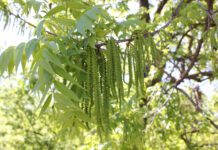
The American Pecan Council (APC) approved in 2016 and the American Pecan Promotion Board (APPB) approved in 2021 are very similar programs. They both utilize industry assessments for marketing and research purposes. They are both mandated programs that are regulated by the Agricultural Marketing Service of the USDA. They are both voted on by growers.
However, as directed by the USDA, both programs must remain separate. This creates collaboration difficulties between the two programs. USDA wants to protect each program and therefore both APC and APPB must not comingle proprietary information. This creates a quandary for staff and membership of both programs.
One of the most important responsibilities of a member sitting on the Board or Council is to be a good steward of the pecan industry’s investment. Through the Committee process, both programs ensure that every dollar utilized is vetted accordingly. Marketing dollars are segregated amongst various partners possessing expertise in the firm’s area of marketing prowess. Research dollars are granted to universities that propose studies that investigate ways of discovering differentiators possessed by pecans but not other nuts. Research studies must abide by strict payment policies to ensure the work gets done in a timely manner.
The pecan industry’s two programs place it in a very unique position. Pecan is the only tree nut to have two USDA-mandated programs. Between the two programs, the industry can:
- Assess pecans coming into the U.S.
- Implement mandatory grades and standards (although they are voluntary)
- If mandated, enforce grades and standards on incoming pecans from other countries
- Audit handlers to ensure they are in compliance with the marketing order
- Apply for grant funding through Foreign Ag Service for international marketing
- Provide detailed data on shipments, imports, exports and inventory
- Invest industry dollars into various marketing campaigns to increase pecan awareness
and consumption
Invest industry dollars to ensure members of both programs have a clear understanding of how pecan dollars are invested to increase consumption.
The two programs share some of the same authorities including research and marketing. This is where it’s vital that the two programs work together to ensure efforts and costs for those efforts are not duplicated. What was once controlled solely by the Council now must be segregated between two programs. For instance, with marketing, APC invests in social media influencing, nutritional relations and international marketing. APPB invests in domestic public relations and omnichannel advertising. Furthermore, APPB has chosen to invest industry assessments in Mexico to market pecans and grow consumption in Mexico. As you can see, there’s an awful lot going on between the two programs, and keeping things separate and efficient requires collaboration between the two. Speaking of what’s going on, the following are a few of the items that were discussed at both the Board and Council meetings in late July.
American Pecan Promotion Board Approves Budget
On July 26, 2022, the American Pecan Promotion Board (APPB) held its meeting to set the budget for the 2022-23 Fiscal Year.
The APPB approved their budget totaling $12 million. During the meeting, the Board approved Weber Shandwick as the Public Relations Firm that will be handling all the marketing strategies for the industry. The $5.5-million program will begin on October 1, 2022. Additionally, APPB approved $500,000 to promote pecans in Mexico. This move will assist in promoting nuts to Mexican consumers, providing an opportunity to increase consumption in Mexico. To date, importers have paid $700,000 in assessments, which accounts for 36% of the total anticipated imports into the U.S. It is anticipated that the APPB will receive between $1.5 to $2 million in import dollars. Currently, APPB is working with USDA and Customs to enforce the collection of the assessments.
Research
APPB approved $500,000 in research for FY 2022-23. Proposals will be called for soon, and the Committee will then begin to look into approving research projects for FY 2022-23.
Assessments
In just 10 months, the Research and Promotion Board has collected over $5 million. In just the last three months, importers have paid $700,000. USDA compiled a list of all importers and delinquent notices have been sent out. Additionally, APPB has begun sending delinquent notices to the domestic industry for those that have not paid the mandatory assessment. It should be stressed that these assessments are mandatory and not voluntary. USDA and Customs will begin enforcing the delinquent payments.
Recent Marketing Campaign
In late June, APPB began its marketing campaign efforts to promote pecans. Going into the month of July, the pecan industry was at 11% to 12% Top of the Mind Awareness (TOMA) for consumers. This was a significant drop from the 42% last fall when the APC launched its fall campaign. However, due to the new program, marketing efforts were suspended for several months until staff, contractors, a new website and PR companies were selected. On June 25, 2022, APPB launched its first marketing campaign in 11 markets. The results were instant! After only three weeks of marketing, pecans went from 11% to 12% to 28%, coming in second place behind almonds (34%) in TOMA levels based on Adcellerant and Fusion Analytic studies. Over 15,000 ads were seen, and the newly created website saw 1000 to 2000 website visits daily. This shows that campaigns are working and are having an impact on consumer awareness. These activities, coupled with the American Pecan Council’s efforts, will provide a great opportunity for the two organizations to work together and raise consumption, awareness and educate consumers on the health benefits of pecans.
American Pecan Council Approves Budget
On July 26, 2022, the American Pecan Council (APC) held its meeting to set the budgets for the 2022-23 Fiscal Year.
APC approved their budget totaling $5,910,000. 45% of the budget is focused on international marketing. Thanks to the APC’s efforts, the pecan industry received $1.175 million in Market Access Program and Emerging Market Program dollars. The two major campaigns focus on China and Germany.
Additionally, APC received dollars to start exploring the market in India. Last year was a record year for exports for the American Pecan industry. However, this year, with a smaller crop, exports have been smaller. Nevertheless, without the export markets, domestic markets would feel greater pressures, having an impact on returns.
Lastly, APC has applied for dollars to promote in the United Kingdom (UK). The UK continues to be an important market for pecans.
At the peak of China, the industry was exporting 80 to 100 million pounds (big crop year). Last year, the industry exported over 120 million pounds, with only a small amount going to China. It is important that APC continues to focus on the international marketing efforts for American Pecans in order to maintain consumer awareness and consumption when the large crops are produced.

Grades & Standards
Recently, USDA published the Grades & Standards updates that the industry requested in 2018. After a detailed analysis and early comments by the industry, USDA published additional clarification on the proposed grades and standards. The two supporting documents are in alignment with the industry proposal. APC, with approval from the USDA, commented on the proposal and supported the changes with supplemental documentation along with minor edits to the published standard. APC will continue to monitor the situation and update the industry as USDA prepares the final publication.
Quality Assurance Program
APC has begun its next phase of the Quality Assurance Program. With pressure from consumers, the European Union and several buyers demand for quality, sustainability and an independent third-party verification tool. Thanks to APC, the industry is in its final phase of providing a tool for growers and shellers to use that will satisfy these requirements. This program is designed by the industry and is a voluntary, not mandatory, program.
Comments have been received by the industry, and the working group is now going through the comments and updating the draft document. Once approved, the industry will begin several pilot programs that may be used to measure the program.
Data
APC continues to improve its data collection. This is a very important piece of the Federal Marketing Order. Without data and the power to audit handlers, the industry would not have a mechanism to check the numbers published. The power of the APC to audit handlers keeps everyone honest and is showing in the numbers that are being reported.
As you can see, these two programs are fighting for you to tell the Story of Pecan.















